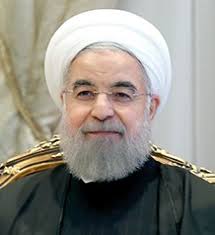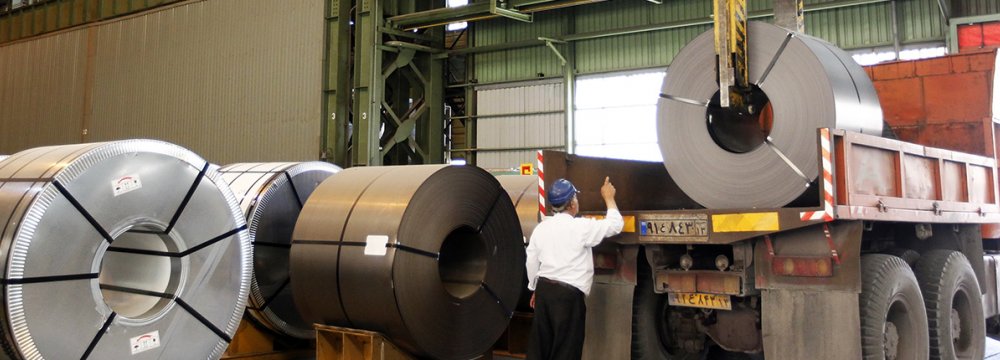
A Market Divided: Flat Steel Users Decry Reduced Supply

“The letter penned by a number of lawmakers to help rolling mills and flat users by either increasing semi-finished steel supply or reducing flat steel import duties was brought to the president, and deemed necessary to be acted upon,” Amir Hossein Kaveh added, noting that the president’s chief of staff, Mohammad Nahavandian, has informed First Vice President Es’haq Jahangiri of the decision.
 Flat producers argue that things have changed, but the syndicate still considers the supply to be severely limited while high tariff walls prevent users from procuring supplies from other sources.
Flat producers argue that things have changed, but the syndicate still considers the supply to be severely limited while high tariff walls prevent users from procuring supplies from other sources.
The Syndicate of Steel Pipe and Profile Manufacturers has lobbied extensively to draw attention to the issue for about a year now and their most recent attempt included reaching out to the parliament.
Sinking prices and lack of robust domestic demand prompted steelmakers to prioritize exports over local supply as of 2015. Flat producers argue that although the tide has now turned, the syndicate still considers supply to be severely limited while high tariff walls prevent users from procuring supplies from other sources.
Kaveh called the current state of the local market a “pandemonium” in a phone interview with Financial Tribune. He complained that higher global prices have created an opportunity for semi-privatized steelmakers to boost local prices to unreasonably highs by starving the domestic market and turning to piecemeal supply.
“Insufficient local supply has caused steel prices to jump by an average of 4,000 rials (about $1) per kilograms in the last 15 days,” he said.
The official emphasized that cutting import tariffs on upstream products such as ingots, slabs and coils, and boosting supply are the only way to break the monopoly in the market, put local demand before exports and undo the recent drastic hike in domestic prices.
Kaveh criticized the Cabinet for delaying to communicate the Ministry of Industries, Mining and Trade’s last year decision to reduce tariffs to the Islamic Republic of Iran Customs Administration.
“The decision included cutting duties on flats from 20% to 10%, and slabs from 15% to 5%. The cause of the delay is unknown,” he said.
“Pipe and profile producers are in dire need of flat steel, and rolling mills have no semis because all these materials are being exported while local steelmakers have the tariff wall to protect them. Import duties are meant to protect infant industries, but a producer like Mobarakeh is no infant–it is dumping its products abroad.”
Kaveh was pointing to Iran’s largest flat producer, Mobakareh Steel Company, which was recently accused by its European counterparts of engaging in dumping of hot-rolled coil into the continent. The latest decision by the European Commission was to set a minimum import price of €472 ($544) per ton for Iranian HRC while duties in the range of 5.30-33% will be slapped on shipments higher than that.
MSC, however, remains nonchalant and denies any allegation of wrongdoing.
“The minimum import price will be no trouble and we won’t be hit by any duties,” the company’s head of exports, Alireza Mansouri, told us via telephone. He added that MSC is moving away from exports in the future, as its priority lies with the local market.
Referring to the syndicate’s allegations of dumping, Mansouri said, “They were among the first users to turn to cheap Chinese offerings during the 2015 crisis and leave local producers. If they had bought from us, we would not have been forced to boost exports. And now their allegations have unsettled foreign market regulators.”
MSC to Locally Sell Flats Meant for Exports
Despite their differences, both sides have recently attempted to steer a middle course.
MSC’s flat exports have dropped markedly but production is keeping a steady pace. Now the question is, if the output is not shipped abroad and local users complain of limited supply, where is all that steel headed?
They appear to be stockpiled at ports, MSC’s Managing Director Bahram Sobhani wrote in a letter to Masoud Karbasian, the head of Islamic Republic of Iran Customs Administration.
Written in late July, the letter contains an interesting proposition meant to offer the best of both worlds to the steelmaker and pipe producers.
MSC has offered to sell its flat steel meant for exports to local downstream users. The catch, however, is that the users are obliged to export the final product.
The process is as follows: First, MSC’s products are sold at export prices and considered as exports to benefit from tax cuts. Second, the local user is required to partner with a foreign buyer to pay for the purchase in foreign exchange. Third, the flat steel is to be made into a final product and shipped to the foreign partner and not sold locally.
Financial Tribune’s enquiries from the customs administration revealed that all parties have orally agreed to the proposition’s terms and are awaiting the technical issues to be worked out.
“The proposition is very complicated. It involves both working around regulations and putting down control measures. We are going to hold a technical session with Mobarakeh and the syndicate next week to work it out,” said an official with IRICA’s public relations, who asked to remain anonymous.
Kaveh described the proposition as a “positive move” and said his organization is willing to go ahead with it to procure the fresh supply of materials.
Yet the idea is not without flaws. “There will be too many middlemen,” he said, adding that it will increase the final products’ end prices.


Trump weighs using $2 billion in CHIPS Act funding for critical minerals

Codelco cuts 2025 copper forecast after El Teniente mine collapse

Electra converts debt, launches $30M raise to jumpstart stalled cobalt refinery

Barrick’s Reko Diq in line for $410M ADB backing

Abcourt readies Sleeping Giant mill to pour first gold since 2014

Nevada army depot to serve as base for first US strategic minerals stockpile

SQM boosts lithium supply plans as prices flick higher

Viridis unveils 200Mt initial reserve for Brazil rare earth project

Tailings could meet much of US critical mineral demand – study

Kyrgyzstan kicks off underground gold mining at Kumtor

Kyrgyzstan kicks off underground gold mining at Kumtor

KoBold Metals granted lithium exploration rights in Congo

Freeport Indonesia to wrap up Gresik plant repairs by early September

Energy Fuels soars on Vulcan Elements partnership

Northern Dynasty sticks to proposal in battle to lift Pebble mine veto

Giustra-backed mining firm teams up with informal miners in Colombia

Critical Metals signs agreement to supply rare earth to US government-funded facility

China extends rare earth controls to imported material

Galan Lithium proceeds with $13M financing for Argentina project

Kyrgyzstan kicks off underground gold mining at Kumtor

Freeport Indonesia to wrap up Gresik plant repairs by early September

Energy Fuels soars on Vulcan Elements partnership

Northern Dynasty sticks to proposal in battle to lift Pebble mine veto

Giustra-backed mining firm teams up with informal miners in Colombia

Critical Metals signs agreement to supply rare earth to US government-funded facility

China extends rare earth controls to imported material

Galan Lithium proceeds with $13M financing for Argentina project

Silver price touches $39 as market weighs rate cut outlook

















